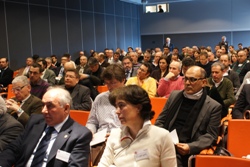It was standing room only at this popular seminar to discuss the future availability of pest control products within the Italian market. There was heated discussion as the likely effects of the Biocidal Products Directive (BPD) became clear.
The primary concern expressed was the likely future reduction in the number of products available to the practical pest controller. And for those left, their price. The causes for this deline in products fall into two.
|
The first cause is due to the likely loss of minor use products where no manufacturer is prepared to invest in the required data dossiers. The second, and the one which caused the heated debate, was very much what the group felt was an unintended by-product of the registration requirements stipulated under the BPD. The small and medium sized Italian pesticide manufacturing companies feel they are likely to have their product ranges much depleted, as these companies rely on access to the registration dossiers of active substances held by several of the large multi-national companies. Rather than sharing their data, the multinationals are, somewhat understandably, closely guarding access. Interestingly ANID vice-president, Lorenza Brazzoduro, used this issue as an example as to what is being caused by the European institutions via the creation of Directives such as the BPD who said: “What is occurring is totally contrary to the objectives set-out under the Treaty of Rome when establishing the European Economic Community – namely free competition and circulation of goods. What is happening is polarization of products into the hands of the large multinationals – in effect the creation of an oligopoly within the EU, in open violation to the basic concept of free competition.” Support for their cause was on hand, as demonstrated by some of the other speakers on the seminar panel. Luisa Gabrielli from the agrochemical section within Union Chimica (an association representing small & medium sized companies) encouraged effected manufacturers to club together and mount a lobby at EU level. Correct yes, but one questions if this is in any way realistic or achievable. Relatively recently into her post as head of department was Dr Marcella Marletta at the Dispositivi Medici del Ministero della Salute (Ministry of Health and responsible for registrations) who said she was sympathetic to this cause a gave her word she would do all she could to fight against the EU multi-nationals. For this she received an appreciative round of applause from the audience. Maybe understandably, there were no speakers from the large multi-nationals on the platform to put forward their side of the argument. Reaction from a multi-national For what would be regarded as more generic actives, certain ‘big’ companies took the initiative at the start of this procedure and invested time and money preparing dossiers so as to achieve Annex I listing for selected active substances. Having done so, they again feel justified in not granting Letters of Access to anyone who might come along and request one – they are concerned that once given there is no guarantee the recipient would buy the material from themselves – rather maybe from a cheap Chinese source that has not invested in a Biocides dossier. |
|
|
|
Those companies who do have Annex I listing will continue to make these actives available, but via companies with whom they have often long-established trading relationships and commercial supply contracts in place. This is an issue far from unique to Italy and one that is certainly likely set to run and run. |
||





